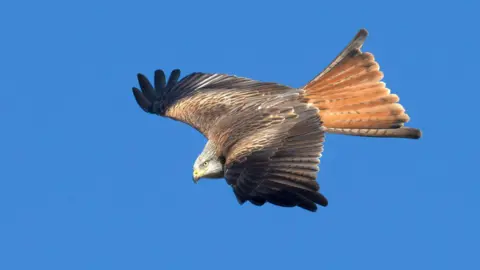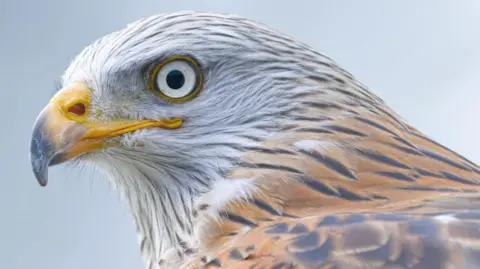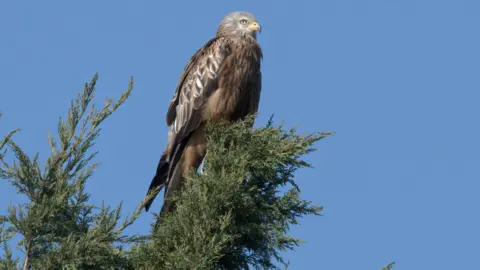Why you should admire red kites but not feed them
 Steve Gozdz/GG Wildlife Experiences
Steve Gozdz/GG Wildlife ExperiencesAn Oxfordshire wildlife group has started a campaign to raise awareness of red kites and encourage people to stop feeding them.
Mike Acreman, trustee of Wild About Wallingford, said there had been "a change in the behaviour" of some of the birds which were now associating people with food.
He said there had been reports of kites sweeping closer to people and even affecting pets.
Mr Acreman said the campaign aimed to promote "how wonderful kites are" but also to "manage interactions with wildlife".
A brief history of kites in the Chilterns
Mr Acreman said red kites "were considered a nuisance and a bounty was put on their heads" in Tudor times.
Neil Jackson from Chilterns National Landscape explains that was because they scavenge for food and were associated with refuse tips.
He said: "In the medieval ages, they were very common birds.
"They were persecuted to the point of extinction in this area of the country".
But reintroduction of red kites to the Chilterns, lead by the former Nature Conservancy Council, began in the late 1980s and continued into the 1990s.
Mr Acreman said there were now about 10,000 individuals "in the general region of South Central England".
"That's quite amazing given that they were originally five pairs," he said.
"In fact, it's the biggest species recovery success story in UK conservation history."
 Steve Gozdz/GG Wildlife Experiences
Steve Gozdz/GG Wildlife ExperiencesHe said the birds were "spectacular when they come down", adding: "You often notice them when you're driving along in the car and they come down on the road site and take some road kill.
"They have almost two metres wingspan, so you can see why people are excited by feeding them."
Mr Acreman said about 18 or 20 red kites could be seen circling around houses on a Saturday morning.
"But I've also seen them diving in the park and they can be very frightening, particularly for children.
"Wild About Wallingford decided it would be good to have a campaign to promote her wonderful kites are but also tell people not to feed them because that is changing our relationship with them."
Mr Jackson compared it to "a feeding frenzy that you might associate more with a David Attenborough film".
He said: "The negative side is that they associate people with food.
"I myself have had a sandwich knocked out of my hand by one of the birds but, unfortunately, other people have received scratches and worse."
Mr Acreman said he had heard stories of them stealing food from barbecues.
"We've also had some reports from dog owners saying that kites had picked up rotten chicken that people are throwing out into their gardens.
"The kites have dropped it on the grass verge and one lady said her dog had eaten it and become very sick."
 Steve Gozdz/GG Wildlife Experiences
Steve Gozdz/GG Wildlife ExperiencesHe said the group would monitor the effect of the campaign, adding: "We need to manage our interactions with wildlife.
"Therefore, we should be teaching our children, so that they grow up also to love wildlife but to respect it."
Mr Jackson said Chiltern National Landscape supported the initiative.
"We are working with Natural England, British Trust for Ornithology and others to bring together further guidelines for members of the public, which will mean that hopefully people will stop feeding the birds.
"Also, it would lessen these harmful interactions so that we can keep them safe as well as keeping ourselves safe."
Natural England said a report on its findings would be published soon.
Wallingford Town Council said it also supports the campaign.
You can follow BBC Oxfordshire on Facebook, X (Twitter), or Instagram.
